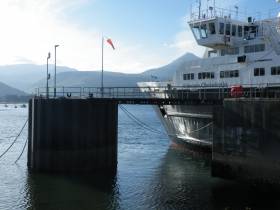Displaying items by tag: £900m CalMac Contract Begins
CalMac's New £900m Scottish West Coast Contract Begins
#CalMacContract - The £900m ferry contract to operate Scottish west coast services awarded to CalMac Ferries Ltd by Transport Scotland earlier this year, has been in force for almost a week.
The contract that began last Saturday, 1 October is valid for the next eight years which will see the extensive network of Western Isles and Clyde ferry operations remain in public hands.
Customers travelling by ferry from the first day of the contract will also see a new 'operator mark' which has been produced to show that Caledonian MacBrayne is operated by CalMac Ferries Ltd. It will not replace the familiar iconic lion rampant heraldic device on ships but will be rolled out across the network in a variety places including on uniforms, on ships, in ports and in printed material, as part of a tender requirement set by Transport Scotland.
CalMac Managing Director Martin Dorchester said: "The new operator mark may seem a small change but it is symbolic of the positive changes we are bringing to the new contract, and will be worn and displayed with pride by everyone at CalMac."
He said: "The start of this contract marks the culmination of almost two years of hard work to develop and submit our bid for the new contract, and everyone at CalMac, and the communities who rely on our ferry services, who provided input and support, can be very proud of their achievement."
"Since the announcement in May and the formal signing of the new contract at the end of August we have been doing the ground work to convert our winning proposals into improvements which will transform the onboard travel experience for our customers over the life of the contract.
These include:
• Providing the most up to date customer information available
• Providing a modern ticketing system.
• Improving accessibility for customers.
• Improving integration with other modes of transport
• Investing £6 million to refresh the appearance of vessels and ports (see redevelopment of terminal at Brodick, Isle of Arann)
He said: "Clearly some of these will take some time to work through, and the delay to signing the contract has also had an impact on progress, but some improvement are already well in hand, and our commitment to these is enshrined in the contract which is legally binding and will be closely managed by our client, Transport Scotland.
"After the years of uncertainty over our future I know everyone is looking forward to playing a part in this an exciting new chapter in the story of CalMac and these vitally important ferry services."
























































